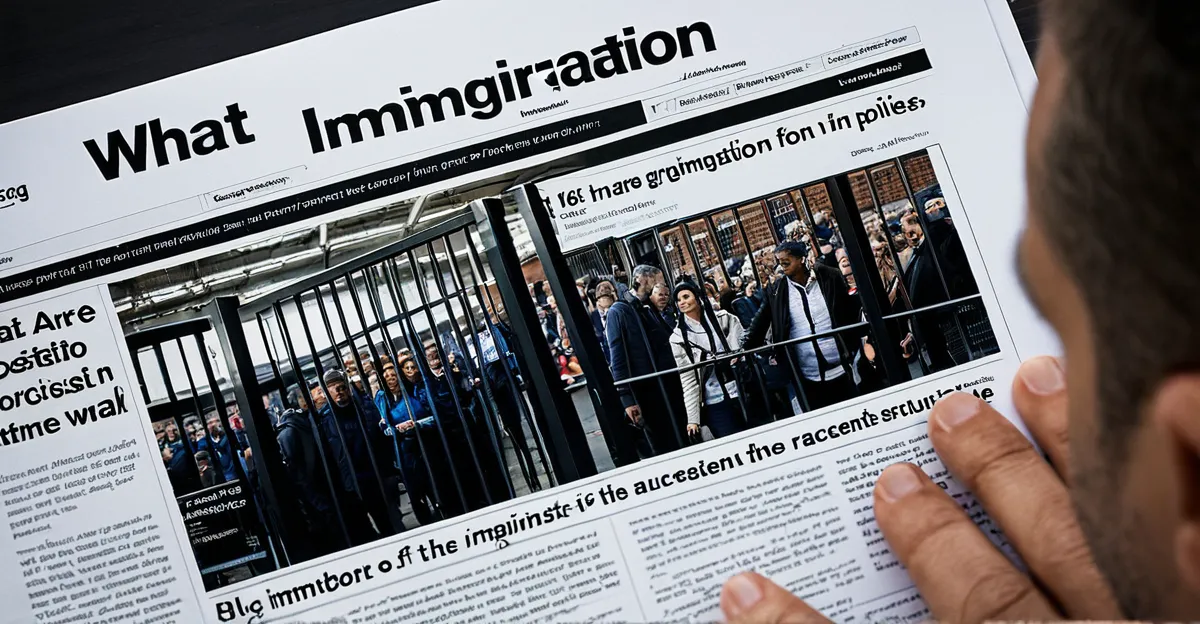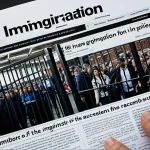Overview of Recent UK Immigration Policies
Recent UK immigration policy changes have centered around tightening entry criteria and streamlining visa processes. Key legislative reforms include the introduction of a new points-based immigration system in 2021, designed to prioritize skilled workers and reduce low-skilled immigration. These recent UK immigration laws aim to attract talent aligned with economic needs while controlling net migration.
The government policy updates emphasize robust border control, labor market optimization, and simplifying visa rules UK-wide. Objectives include promoting high-skilled immigration to address labor shortages, particularly in technology and healthcare sectors, while protecting national security. Additionally, family reunification processes have been redefined to balance humanitarian concerns with immigration control.
Also read : What Are the Least Covered Stories in the UK News Media?
Public discourse remains sharply divided. Supporters stress that these policies enhance economic competitiveness and national security. Critics argue they risk excluding essential workers and complicate legal status of immigrants already contributing to society. Politically, immigration reform has become a focal point during elections, shaping policy direction. This ongoing debate reflects broader societal concerns about integration, social services demand, and cultural identity, making recent UK immigration policy changes a crucial area to watch.
Direct Consequences for Immigrants
Recent UK immigration policy changes have significantly altered the legal status of immigrants by tightening eligibility for residency and citizenship pathways. These changes often require applicants to meet more rigorous criteria, such as increased salary thresholds and stricter language proficiency standards. This impacts naturalization processes and long-term settlement options.
Also to discover : How Has the Landscape of UK Politics Influenced the Nation’s International Relationships?
The immigration procedures UK now incorporate faster but more stringent vetting measures. For example, visa rules UK have been updated to prioritize skilled workers, impacting access to work permits and complicating entry for lower-skilled applicants. Family reunification has also faced restrictions, including narrower eligibility for dependents and longer application wait times.
Applicants must navigate complex requirements that influence their ability to remain or work legally. Case examples highlight immigrants who struggle with extended processing delays or are forced to return due to lost eligibility under revised rules. These difficulties underscore the practical consequences of legislative adjustments on individuals’ lives.
Furthermore, the changes in visa rules UK can affect immigrants’ access to public services and employment rights, emphasizing the need for clear guidance and support. Overall, these recent UK immigration laws reshape routes to stay and work, making compliance more critical than ever for immigrants navigating the system.
Economic Impacts on the UK
The economic impact of immigration UK is deeply influenced by recent UK immigration policy changes, particularly regarding skilled worker shortages. These laws shift workforce dynamics by tightening access for lower-skilled labour, which many sectors traditionally rely on. For instance, industries like agriculture and hospitality face recruitment challenges due to stricter visa rules UK, reducing the available labor pool for essential roles.
Addressing labour market needs, government policy updates aim to prioritize skilled workers, particularly in healthcare and technology. However, the limited flow of lower-skilled workers disrupts sectors dependent on flexible staffing. Recent data indicates that while high-skilled immigration fills critical gaps, labor shortages persist in roles less aligned with the new points-based system.
The economic impact of immigration UK also extends to productivity and innovation, with talent inflows supporting growth in knowledge-intensive fields. However, businesses report increased recruitment costs and delays caused by complex immigration procedures UK. Balancing these factors is crucial to sustaining economic performance.
In summary, while recent UK immigration laws intend to bolster skilled labor supply, their broader economic impact reveals nuanced effects on workforce availability and sectoral labor demands, emphasizing the ongoing challenge of aligning immigration policy with economic realities.
Influence on Employers and Businesses
Recent changes in UK immigration policy have introduced stricter requirements for employer sponsorship UK programs, increasing administrative complexity and compliance costs. Businesses must now adhere to more rigorous checks when sponsoring foreign workers, including tighter record-keeping and reporting obligations aligned with business immigration compliance mandates.
These government policy updates compel employers to adapt workforce planning, often leading to a focus on recruiting from the domestic labour pool or prioritizing highly skilled international candidates who meet the new visa thresholds. Small and medium enterprises particularly feel the strain due to limited human resources to navigate the heightened bureaucracy.
Industry leaders report that the evolving immigration procedures UK have extended hiring timelines and sometimes restricted access to essential talent, prompting shifts towards automation or alternative staffing models. However, employer feedback highlights inconsistent guidance from authorities as a challenge.
Despite these hurdles, some sectors value the clarity brought by recent laws, enabling more predictable hiring practices under official sponsorship frameworks. Overall, the impact on businesses underscores the importance of carefully managing immigration compliance while innovating workforce strategies amidst ongoing policy transformations.
Social Services and Community Integration
Recent UK immigration policy changes have influenced demand for public services such as housing, education, and healthcare. Stricter visa rules UK and reduced low-skilled immigration have slightly eased pressure on some local services. However, areas with high immigrant populations still experience challenges in accommodating increased needs. School enrolments, for example, reflect diverse populations, requiring resources for language support and cultural inclusion.
Social integration remains complex amid tightened immigration procedures UK. Community impact of immigration involves balancing newcomers’ needs with existing residents’ concerns. Integration programs aim to foster cohesion by promoting language acquisition, employment access, and civic participation. Yet, bureaucratic hurdles related to immigration status may hinder full engagement in community life.
Local authorities report mixed effects from recent UK immigration laws. While some welcome immigrants’ contributions to cultural vibrancy and economic activity, others highlight stretched public services and social tensions. Effective government policy updates seek to support integration by funding local initiatives and improving access to social services.
Overall, managing community impact of immigration requires coordinated efforts addressing both immediate service demand and longer-term social harmony, helping build inclusive environments despite evolving immigration frameworks.
Legal, Humanitarian, and Ethical Considerations
Recent shifts in immigration law UK have notably altered the framework for asylum and refugee policy. These changes introduce stricter eligibility criteria for asylum seekers, aiming to prevent abuse of the system while ensuring genuine applicants receive protection. The revised procedures often expedite decision-making but raise concerns about adequate time for claimants to present evidence.
Human rights implications arise as some critics argue that tighter controls may compromise fair treatment. Legal challenges have emerged contesting the balance between border security and safeguarding vulnerable individuals’ rights. Courts have scrutinized decisions under the new immigration law UK, emphasizing compliance with international protection obligations.
Support services for asylum seekers and refugees face heightened demand amid these policy updates. Funding and resource allocation are critical to address the needs of vulnerable groups, including trauma counselling, legal aid, and integration support. Non-governmental organisations play a significant role, bridging gaps left by state provisions.
In summary, while government policy updates seek to enhance system efficiency and national security, they also prompt ongoing debate over humanitarian responsibilities and ethical standards. Ensuring that asylum and refugee policies remain just and compassionate is a complex challenge central to the evolving immigration landscape.










